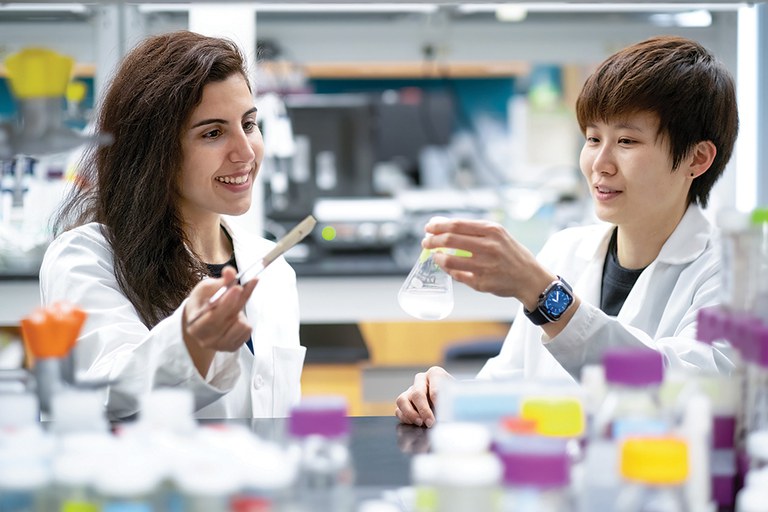Posted: March 30, 2023
Doctoral students help Chesapeake Bay initiative become more sustainable.

Graduate students in Penn State's College of Agricultural Sciences, Parisa Nazemi Ashani, left, and Wei-Shu Lin are working on a project to support the Chesapeake Bay. Photo: Maria Spencer
To support and restore the Chesapeake Bay, partners across Pennsylvania have pledged to plant 10 million trees throughout the state. Now, the project is closer to meeting its goal in a more sustainable way, thanks to an interdisciplinary group at Penn State.
The group, including two doctoral students in the College of Agricultural Sciences, is collaborating with the Chesapeake Bay Foundation and corporate partner Plantra Inc. to help make sure any plastic introduced into the environment as part of the Keystone 10 Million Trees initiative can be effectively removed once trees are established.
This project, part of the graduate Practicum in Innovation and Critical Thinking (AEE 597), is giving students an opportunity to work together with industry to tackle innovation challenges. The course matches students with industry mentors and enables them to apply newfound technical skills towards a "real world" application.
"We learn the importance of not focusing on one person's experience or viewpoint, but to utilize the knowledge of the group," said Parisa Nazemi Ashani, a doctoral candidate in agricultural and biological engineering. "Everyone has blind spots, so it's important to optimize everyone's expertise to set a higher standard and get a better result."
The Chesapeake Bay is impacted by the health of the streams and rivers that feed into it, according to Brenda Lee Sieglitz, senior manager of Keystone 10 Million Trees Partnership for the Chesapeake Bay Foundation. For example, excess nutrients in the water can cause algae blooms that block sunlight from reaching the underwater grasses that serve as food and habitat for aquatic organisms.
Sieglitz said one way to mitigate these effects is by planting trees along the waterways.
To enhance the survival of newly planted seedlings, the foundation works with Plantra for a supply of "grow tubes" and training stakes, which protect and strengthen baby trees as they grow. However, the tubes and stakes are made from plastic and fiberglass, which need to be removed from the environment once young trees are established.
Removal of the support stakes, in particular, can be difficult once they have been in the ground for five to seven years.
Hoping to be proactive about this challenge, Plantra and the Chesapeake Bay Foundation teamed up to develop innovative ideas to ensure easy recovery of grow tube systems for recycling and reuse.
They first reached out to the Sustainability Institute at Penn State, which then connected them to Maria Spencer. As the John and Patty Warehime Entrepreneur in Residence in the College of Agricultural Sciences' Entrepreneurship and Innovation program, Spencer developed the innovation practicum to help students build professional experiences and connections.
Spencer recruited Nazemi Ashani and Wei-Shu Lin, doctoral candidate in agricultural and biological engineering, who worked with Plantra to ideate a degradable "base" for the grow tube's stake to aid in removal and, possibly, to make installation faster and easier.
For her part, Lin researched existing materials. She took into account how quickly the materials would biodegrade and how they would be influenced by the specific environmental conditions of the Chesapeake Bay watershed.
"Everything affects materials when they're outside in the environment, which is something that can be overlooked when you're studying materials in the controlled environment of a lab," Lin said. "It is gratifying to see my work come to life in the real world on a real project."
Meanwhile, Nazemi Ashani researched mycelium, a fungus with emerging potential as a renewable, biodegradable material. She found architectural engineering experts at Penn State to help her evaluate the material's characteristics and economics to establish feasibility for this use.
After analyzing material options and considering product economics, Lin and Nazemi Ashani handed off the project to a Learning Factory team in the College of Engineering, where students will build a prototype, bringing the project closer to reality. A group of biorenewable systems students in the College of Ag Sciences also have undertaken a life cycle analysis of the grow tube system, evaluating other options for sustainability improvements.
According to Spencer, projects like this help build bridges between companies, students and the University.
"These collaborations are mutually beneficial," Spencer said. "Our students lend technical expertise and innovation potential to companies and, in return, benefit tremendously from industry mentorship and professional networking."
Joe Lais, founder of Plantra, said he sees the partnership leading to additional projects with Penn State to enhance tree-establishment sustainability.
"Today, we're focused on how the greenhouse grow tube can be supported by an improved staking concept that enables easier field recovery of the entire system and promotes higher reuse rates for the support stake," he said. "Tomorrow's challenge could target improving the sustainability of the grow tube itself. The opportunities to eliminate or minimize the impact of introducing plastics into the environment is our goal, and we believe Penn State can help get us there."
--Katie Bohn
Features
Fostering Forests
Across the United States, forests face unprecedented threats, and scientists in Penn State's College of Agricultural Sciences are conducting novel and complex research to conserve them.
Buzzing With Purpose
Community scientists work to protect Pennsylvania's wild bees
Conservation Reimagined
Exploring new approaches to cope with a changing climate


